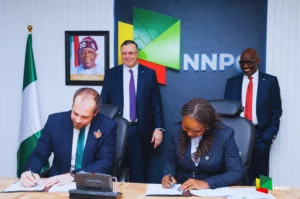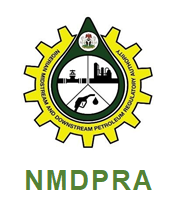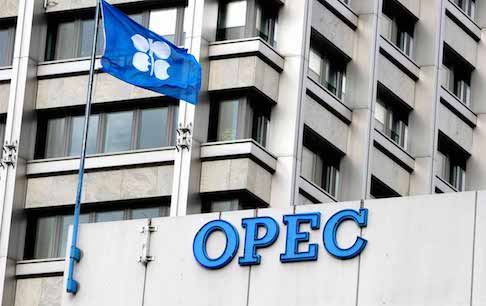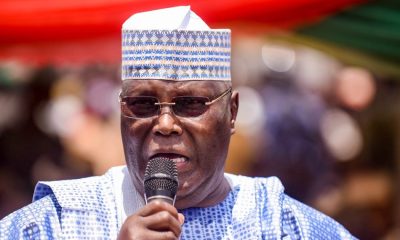Oil & Gas
NNPC Ltd, TotalEnergies Sign MoU on Adoption of Methane Detection Technology

The Nigerian National Petroleum Company Limited (NNPC Ltd) has signed a Memorandum of Understanding (MoU) with TotalEnergies for adoption and deployment of Airborne Ultralight Spectrometer for Environmental Application (AUSEA) in its upstream operations.
The agreement is a direct benefit from the Company’s participation at the recently concluded United Nations Climate Change Conference (COP28) in Dubai, UAE.
A statement on Tuesday by Olufemi Soneye, Chief Corporate Communications Officer, NNPC Ltd, stated that with the agreement, the company would be able to deploy the TotalEnergies AUSEA, known as methane detection technology on its upstream operations sites.
This, will ascertain the level of methane emissions from them, with a view to working out emission curtailment measures to help in combating global warming and climate change.
The MoU was signed by Oritsemeyiwa Eyesan, NNPC Ltd’s Executive Vice President, Upstream, and Managing Director and Country Chair, TotalEnergies EP Nigeria, Matthieu Bouyer, on behalf of their respective companies.
Putting the deal in proper perspective, the NNPC Ltd’s Executive Vice President, Upstream, Oritsemeyiwa Eyesan, said the pilot phase of the TotalEnergies AUSEA deployment would be on NNPC Ltd’s owned operations.
Eyasan added that the deal would enable the company to deploy methane abatement measures.
Other benefits of the TotalEnergies AUSEA technology include identification of unaccounted emission sources, establishment of a basis for querying and improving current emission reporting processes.
It will aid in provision of data to review operational system and implement corrective actions, and estimation of flare combustion efficiency.
The agreement was signed under the watch of the Group Chief Executive Officer (GCEO) NNPC Ltd, Mele Kyari, and Chairman and Chief Executive Officer of TotalEnergies, Patrick Pouyanné.
Speaking at the event, Kyari described TotalEnergies as a great and reliable partner over the years with whom the company was looking forward to exploring greater opportunities in the nation’s energy sector.
On his part, Pouyanné said his company was offering the technology to NNPC Ltd, in keeping with its commitment to promote responsible production of hydrocarbons.
He applauded NNPC Ltd for its successful transition into a limited liability company, stressing that he could feel the energy that the reforms have brought about, not only in the company but also in the sector. (NAN)
Oil & Gas
Nigeria Must Act Fast to Drive Electric Vehicle Adoption – MEMAN

Major Energies Marketers Association of Nigeria (MEMAN) has warned that Nigeria cannot afford to be left behind in the global shift to clean mobility, calling for urgent collaboration to fast-track Electric Vehicle (EV) adoption.
Its Executive Secretary, Clement Isong, gave the warning during an online webinar titled “Accelerating Electric Mobility Adoption in Nigeria by Unlocking Downstream Potential” on Monday.
Isong said that the association had already taken practical steps by installing 12 EV charging and battery-swapping stations alongside five aftersales facilities across the country.
“Collaboration among regulators, investors, and private sector stakeholders is critical to building a viable EV ecosystem in Nigeria.
“MEMAN remains committed to fostering dialogue and innovation in the downstream sector,” Isong said.
He said that with transportation accounting for 28 per cent of Nigeria’s greenhouse gas emissions and rising fuel prices burdening households and businesses.
Director of Operations, Nigerian Midstream and Downstream Petroleum Regulatory Authority (NMDPRA), Dr Mukaila Oseni cited the International Energy Agency’s forecast that the number of EVs worldwide will rise to 145 million by 2030.
“Nigeria must diversify its energy mix, lower transportation costs in the long run, and reduce carbon emissions.
“EV adoption is no longer optional. It is essential,” Oseni said.
He, however, admitted challenges remain: high upfront vehicle costs, weak charging infrastructure, unreliable grid power, and low consumer awareness.
Oseni added that NMDPRA had been reviewing regulatory policies to encourage private investment, technology adoption, and innovative business models.
He further urged stakeholders to leverage the nation’s vast fuel retail network as future charging hubs, while also considering interim options such as compressed natural gas (CNG) and liquefied petroleum gas (LPG) as cleaner alternatives.
The webinar, hosted by MEMAN’s Competency Centre, highlighted financing models, local vehicle assembly, and consumer education as critical tools to make EVs accessible and affordable.
With the world moving rapidly towards electrified transport, participants agreed on one point: Nigeria must act decisively to embed EVs in its energy transition strategy or risk being left behind.
| ReplyReply allForwardAdd reaction |
Oil & Gas
Lawyers Integral to Optimal Regulatory Compliance in Oil Business – NMDPRA

The Midstream and Downstream Petroleum Regulatory Authority (NMDPRA) said the role of legal practitioners is critical across the midstream and downstream energy business value chain in the promotion of optimal regulatory compliance.
Chief Executive, NMDPRA, Farouk Ahmed said this on Monday in Abuja at its 2025 General Counsel and Legal Advisers Forum for Midstream and Downstream Petroleum Companies in Nigeria.
The forum has its theme as ‘Advancing a Collaborative Compliance Culture in Nigeria’s Midstream and Downstream Petroleum Sectors’.
Ahmed was represented by Ogbugo Ukoha, Executive Director, Distribution System, Storage and Retailing Infrastructure, NMDPRA.
He said that the sector’s complexity required a unified compliance culture, rooted in robust and enabling legal frameworks, transparency, accountability and shared responsibility.
“The scope of operations of the sector covers hydrocarbon processing, wholesale marketing, transportation, storage, distribution and retail, and its complexity requires more than technical efficiency.
“The role of legal practitioners is critical across the midstream and downstream energy business value chain.
“They help to promote optimal regulatory compliance to set rules and standards of operations in our complex operational and volatile market environment,’’ he said.
Ahmed said that strategic and pragmatic solutions would be established from the forum to enhance performance of the sector towards creation of shared value for investors and the extensive market of Nigeria and the region.
He said that the Petroleum Industry Act (PIA 2021) had fundamentally restructured Nigeria’s petroleum industry by delineating regulatory responsibilities of the industry into the Upstream, midstream and downstream Petroleum operations.
According to him, the Act prescribed that all operations in the midstream and downstream sectors could only be conducted under appropriate licenses, permits and authorisations granted by the NMDPRA.
He said the PIA also mandated NMPDRA to make regulations concerning midstream and downstream petroleum operations in consultation with its licensees and stakeholders.
“As a result of the feedback received from our stakeholders on the need to strengthen regulatory compliance through simplified regulations, NMDPRA is implementing an inclusive stakeholder process of streamlining the gazetted and published regulations.
“This process will mitigate the complexities of navigating and implementing numerous regulations; eliminate inconsistencies and repetitions across multiple regulations; streamline regulatory processes for ease of business; and encourage investments in the industry.
“Kindly use this forum to critically review and make recommendations on the above.
This will enable us to improve the overall compliance of operators and the performance of the regulatory instruments (Legal frameworks and licenses) in the midstream and downstream sectors,” He said.
He said that NMDPRA would continue its commitment to effective stakeholder collaborations that would foster ease of doing business, investor confidence and sustainable operations.
Deputy Speaker, House of Representatives, Benjamin Kalu said that the PIA as a testament to the foresight and dedication of the National Assembly, had fundamentally reshaped Nigeria’s petroleum sector.
Kalu was represented by Ugochinyere Ikenga, Chairman, House Committee on Petroleum Resources, Downstream.
He said that the act had proven how strategic legislation could serve as a potent catalyst for compliance, investment attraction, and robust sector growth.
“For the PIA to remain truly effective, adapting to a dynamic global energy landscape and addressing unforeseen challenges, there must be an institutionalised robust mechanism for its continuous refinement.
“This is precisely where the invaluable insights of our nation’s petroleum experts and our general counsels, the legal architects and navigators of this complex framework, become indispensable.
“For or further synchronisation and effective post-legislative scrutiny, we must actively solicit and integrate your concerns.
“We envision a future where the National Assembly’s specialised committees regularly invite you professionals to public hearings and dedicated technical working groups,” he said.
Kalu said that this proactive engagement would transform abstract legal principles into tangible operational realities, furnishing us with the real-world data and case studies needed to truly understand the PIA’s strengths and weaknesses.
“Your feedback will illuminate where the PIA might be technically challenging, where legal interpretations create bottlenecks, or where new global trends necessitate legislative evolution,’’ he said.
Oil & Gas
OPEC Launches Campaign for Sustained Global Upstream Investment

Torough David, Abuja
The Organization of the Petroleum Exporting Countries (OPEC) has launched a global investment drive seeking attention to creating value in the upstream oil and gas industry.
The Organization is calling for urgent and sustained investment in the global upstream oil sector, warning that a cumulative $14.
9tn will be required between 2025 and 2050 to meet projected demand and prevent a future energy crisis.This investment figure, equivalent to $574bn annually, represents the bulk of the $18.2 trillion in total oil-related investments needed over the 25-year period.
The OPEC had projected that $18.2tn investment would be required to meet global oil demand between 2025 and 2050, as it dismissed the notion of a looming peak in fossil fuel consumption as a “fantasy.
”According to the 2025 World Oil Outlook of OPEC, oil demand is projected to rise from 103.7 million barrels per day in 2024 to 116.5 mb/d by 2045 and peaking at around 123 mb/d by 2050, an 18.6 per cent increase over 26 years.
It also noted the need for continued investments in various segments of the sector to meet this demand.
It noted that of the total investment requirement, upstream operations, including exploration and production, are expected to gulp the lion’s share at $14.9tn, or $574bn per year, as producers scramble to ramp up supply. Midstream and downstream investments will require $1.3tn and $2tn, respectively.
“Cumulative oil-related investment requirements to meet projected demand are assessed at $18.2tn over the period between 2025 and 2050.
“This is marginally higher than projected in the WOO 2024, as despite the outlook period being one year shorter, this Outlook has also seen long-term oil demand revised upwards, and liquids supply has followed.
“Total upstream investment requirements make up the bulk of the needed capital expenditure, now projected at $14.9tn, or $574bn per annum. Downstream and midstream investment requirements are projected at $2tn and $1.3tn, respectively,” the report said.
OPEC Secretary-General, Haitham Al Ghais, said continued investments are essential to guarantee future energy security and affordability, especially in the Global South.
“There is no peak oil demand on the horizon,” Al Ghais declared in the report’s foreword. “Efforts to rapidly phase out fossil fuels are unrealistic and disregard energy security, affordability, and socio-economic realities of billions still lacking basic energy access,” he said.




















